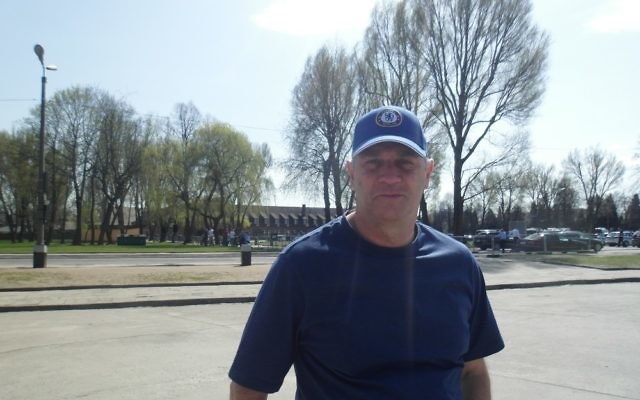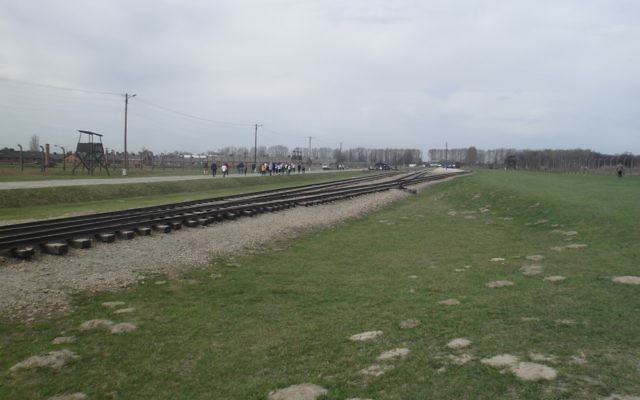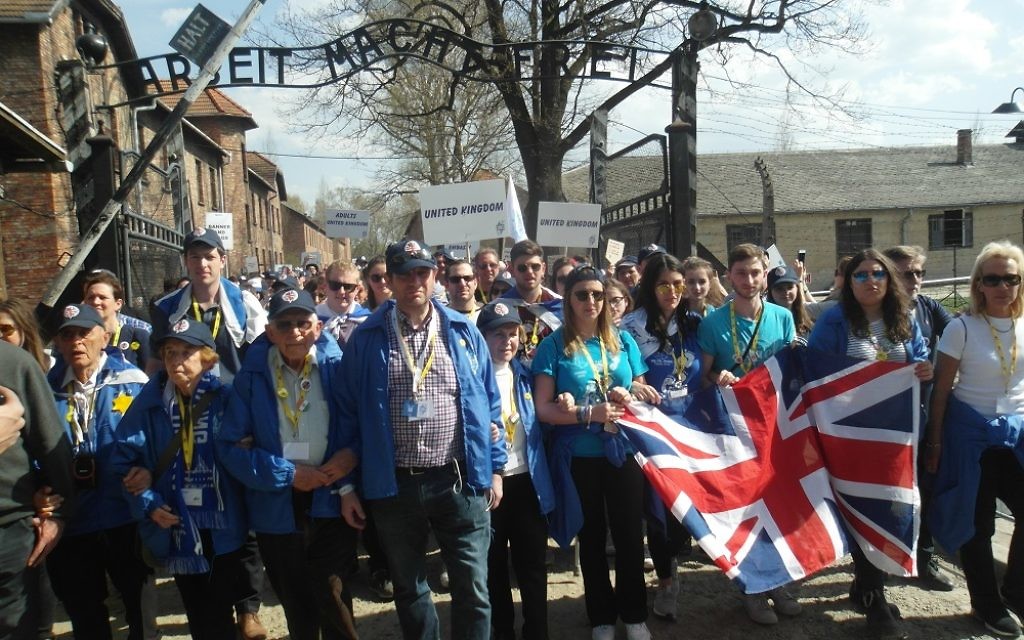March of the Living diary – Part IV: The March of the Living
Jewish News’ Andrew Sherwood has joined the UK delegation in Poland and is documenting his trip
Jewish News’ Andrew Sherwood is among nearly 300 Brits who have travelled to Poland for this year’s March of the Living trip.
Day Five:
The fifth and final day was all about the March itself. Enjoying a relative lie-in, leaving the hotel at 7.45am instead of 6.30am, we did though first pay the most fleeting of visits – and posed for a photo – outside Oskar Schindler’s factory.
Back on the coach and taking a slight detour to Auschwitz Birkenau, my mind was initially side-tracked having tried to set up a series of interviews with members of the Chelsea delegation the Premier League club were sending, for the past few weeks. Fortunately, having gained a press pass, on the basis that the two security guards thought I deserved a break for being an Arsenal supporter, I had free access to the most cordoned off of places and as a result, was eventually able to secure interviews with Chairman Bruce Buck, former Chelsea and Israeli manager Avram Grant, youth team manager Jody Morris and Sir Steve Redgrave, who was acting as a club ambassador. Grant had gone AWOL which allowed me the opportunity to ask Buck, over a packed lunch, why it was so hard to secure an interview with Roman Abramovich – let’s just say, watch this space.
Get The Jewish News Daily Edition by email and never miss our top stories Free Sign Up

By mentioning football, I’m not trying to detract from the importance of the day and occasion, if anything it provided some form of light relief from what had been one of the most energy-sapping and emotional weeks, quite possibly of my life.
Once the interviews were over, I snaked my way past the first two blocks, navigated past the UN Ambassador section, cut across several now empty pathways and made my way to Block 6 to find the UK Delegation. A long (relatively long) wait ensured, before we set off, ever so slowly, in the direction of the famous/notorious Arbeit macht frei gate. A flash of the press pass saw the stewards part like the Red Sea, allowing me to be in the privileged position of being in front of the delegation as they edged ever closer, before passing underneath the gate.
While grateful to be there and catch the moment on the video camera, it did mean that I wasn’t able to appreciate the significance of the moment, something that as I type this at 2.25 the following morning, is beginning to play on my mind. Once the delegation were past the gate, another 100 yards or so saw them out on the main road, before the procession basically fragmented and turn into a stroll to Birkenau.
The sight of young Polish kids waving flags, people from the likes of Korea handing out leaflets, apologising for The Holocaust, was touching, but that – for me – was that. Any sense of occasion had gone and I spent the next 15-20 minutes, until we got to the stage, chatting to a fellow member of the delegation.
The ceremony itself was a strange affair. Again, not wishing to press home how obtaining this press ticket was akin to winning a golden ticket a la Charlie & The Chocolate Factory, but it did give me a privileged position of viewing the speeches from an elevated stage, in contrast, my fellow delegates couldn’t even hear or see properly the subtitles on the screen. I would personally describe Polish Holocaust Survivor Edward Mosberg’s account as being the most stirring thing I’ve ever heard – which is why I’ve put it up in full on the JN’s YouTube channel. A long watch – it’s in two parts – (and apologies for the shaking & out of focus early on), but from 8-9 minutes on, the anger, emotion and sheer outright hatred – all of which is justified – is something, as I say, I’ve never seen before.
Israeli President Reuven Rivlin, and his Polish counterpart Andrzej Duda, then gave their speeches, by which time, and I truly hate to say it – my – and a lot of people around me – interest was wading. Moving out of the press section and joining my fellow group members on the grass behind, there was – and I appreciate it it’s the most unfortunate word to use – a summer camp feeling to it. People (the younger element of the crowd) were swapping badges, caps and bags from different countries, teens were playing on the grass, people were posing for photos on the railway tracks and around the cattle car. People deal with visiting Auschwitz in different ways, in fact we discussed this the previous evening and agreed there was no right or wrong way to react to it. For me though, it left something unsavoury in the mouth. I was just a big a culprit as anyone else, going off to take a look at the barracks, as the ceremony played out in the ever-increasing background and there was more than a tinge of sadness when I heard kaddish read over the loudspeakers, only to be standing by the entrance.

Reflecting back on the trip on the coach home, together with our final processing session, the first comforting thought were the words used to describe the ceremony, which weren’t exactly flattering. But much more importantly, I knew in myself what a worthwhile six days this had been.
Grateful for having the chance to attend this event, even more grateful for the wonderful educators we had on hand – Richard and Jude, together with bus leaders Talia and Phil, and the relentless work of Scott Saunders, for without whom, this visit wouldn’t even be in existence.
The trip was entirely what I had expected – and more. It’s hard to sum up in words, but painful, hurtful, emotional, shocking and raw anger are a start. I saw things I didn’t want to see, saw things I’ll never forget, and yet at the same time it made me more proud to be a Jew than I ever had before.
I made two vows as the day ended. One, to return to Auschwitz, and secondly to become a Survivor volunteer. But one thing this trip did make me do – and I don’t really care if it sounds corny – is to quite simply Never Ever Forget.
You can read PART I of Andrew’s March of the Living diary here
You can read PART II of Andrew’s March of the Living diary here
You can read PART III of Andrew’s March of the Living diary here

Thank you for helping to make Jewish News the leading source of news and opinion for the UK Jewish community. Today we're asking for your invaluable help to continue putting our community first in everything we do.
For as little as £5 a month you can help sustain the vital work we do in celebrating and standing up for Jewish life in Britain.
Jewish News holds our community together and keeps us connected. Like a synagogue, it’s where people turn to feel part of something bigger. It also proudly shows the rest of Britain the vibrancy and rich culture of modern Jewish life.
You can make a quick and easy one-off or monthly contribution of £5, £10, £20 or any other sum you’re comfortable with.
100% of your donation will help us continue celebrating our community, in all its dynamic diversity...
Engaging
Being a community platform means so much more than producing a newspaper and website. One of our proudest roles is media partnering with our invaluable charities to amplify the outstanding work they do to help us all.
Celebrating
There’s no shortage of oys in the world but Jewish News takes every opportunity to celebrate the joys too, through projects like Night of Heroes, 40 Under 40 and other compelling countdowns that make the community kvell with pride.
Pioneering
In the first collaboration between media outlets from different faiths, Jewish News worked with British Muslim TV and Church Times to produce a list of young activists leading the way on interfaith understanding.
Campaigning
Royal Mail issued a stamp honouring Holocaust hero Sir Nicholas Winton after a Jewish News campaign attracted more than 100,000 backers. Jewish Newsalso produces special editions of the paper highlighting pressing issues including mental health and Holocaust remembrance.
Easy access
In an age when news is readily accessible, Jewish News provides high-quality content free online and offline, removing any financial barriers to connecting people.
Voice of our community to wider society
The Jewish News team regularly appears on TV, radio and on the pages of the national press to comment on stories about the Jewish community. Easy access to the paper on the streets of London also means Jewish News provides an invaluable window into the community for the country at large.
We hope you agree all this is worth preserving.
-
By Laurent Vaughan - Senior Associate (Bishop & Sewell Solicitors)
-
By Laurent Vaughan - Senior Associate (Bishop & Sewell Solicitors)
-
By Laurent Vaughan - Senior Associate (Bishop & Sewell Solicitors)
-
By Laurent Vaughan - Senior Associate (Bishop & Sewell Solicitors)






















